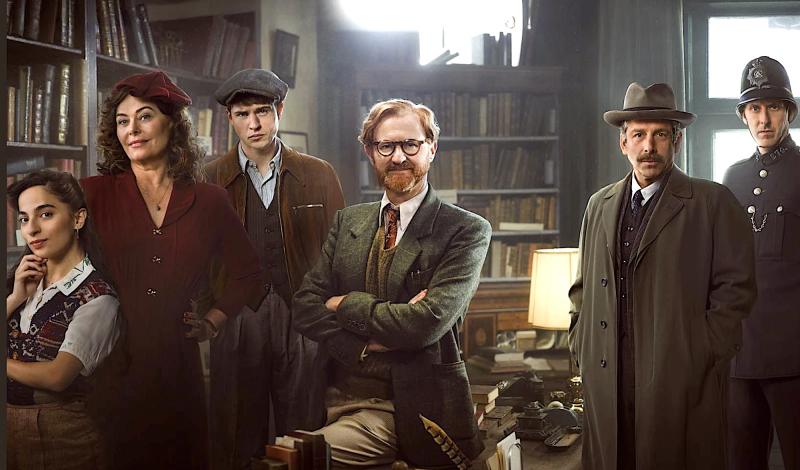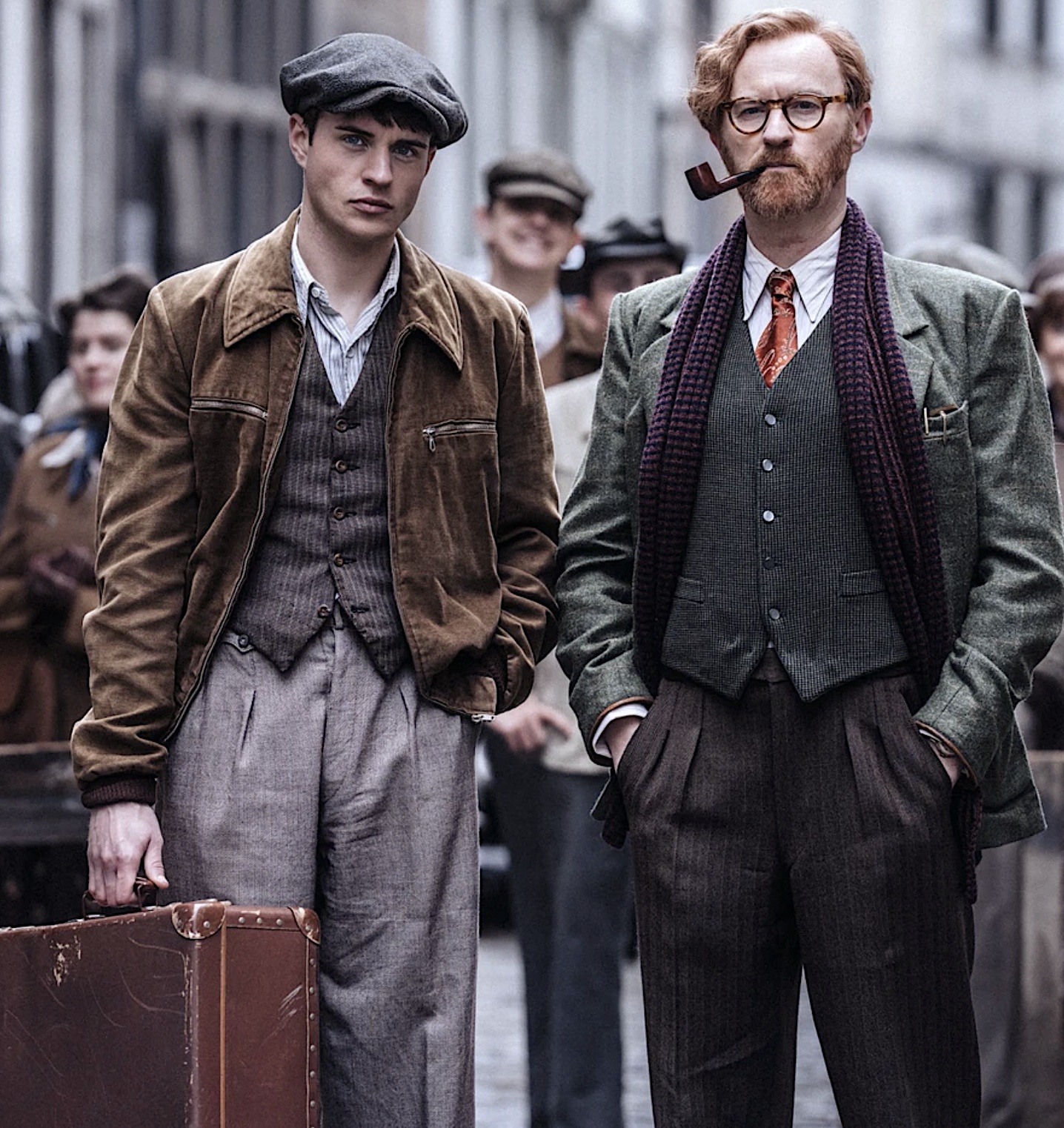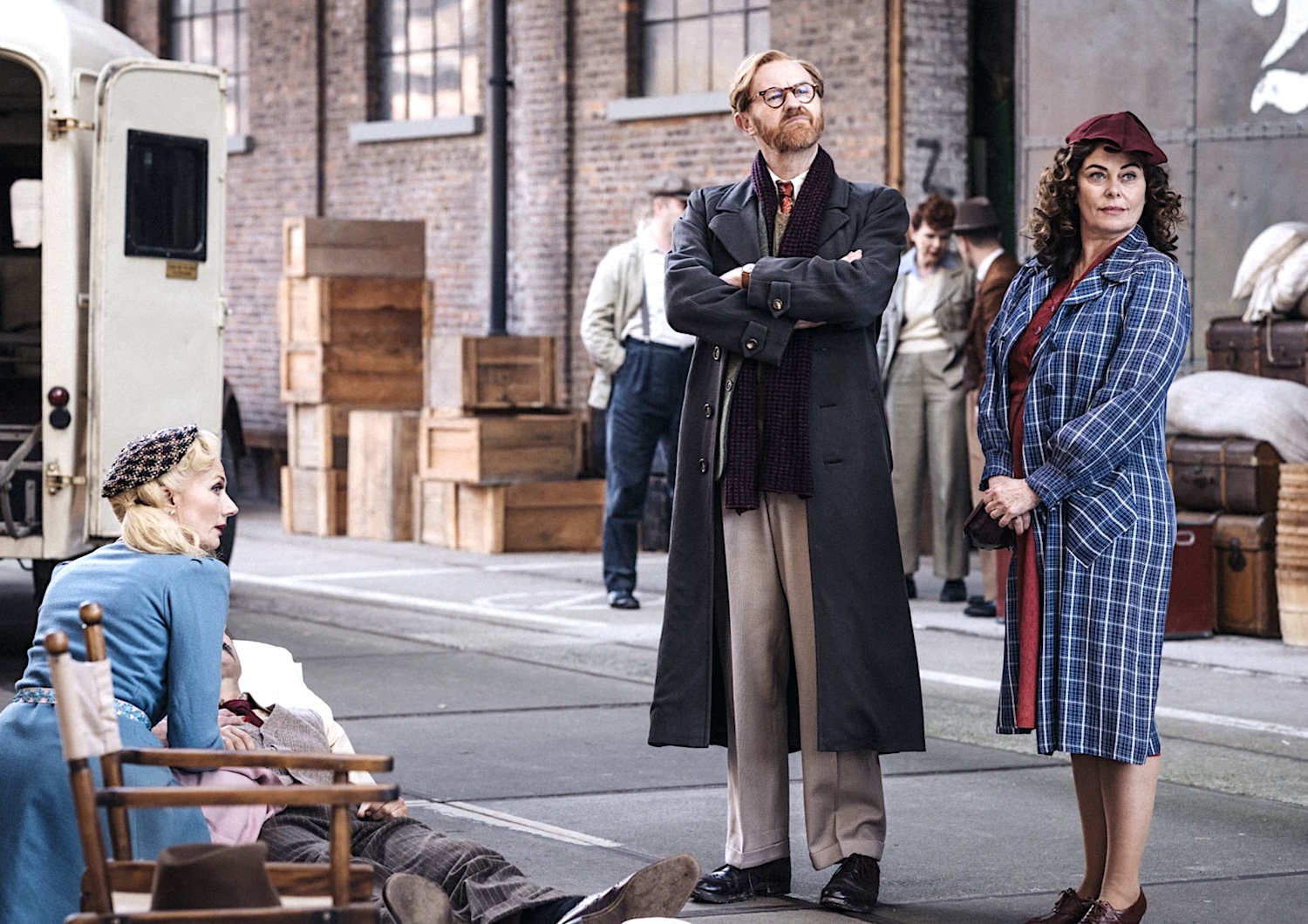Bookish, U&Alibi review - sleuthing and skulduggery in a bomb-battered London | reviews, news & interviews
Bookish, U&Alibi review - sleuthing and skulduggery in a bomb-battered London
Bookish, U&Alibi review - sleuthing and skulduggery in a bomb-battered London
Mark Gatiss's crime drama mixes period atmosphere with crafty clues

As a sometime writer of Poirot, Sherlock and Christmas ghost stories, Mark Gatiss is no stranger to enigmatic crimes and bizarre occurrences set in carefully-recreated versions of the past. He revisits similar themes in Bookish, his new series about a second-hand bookseller in post-World War Two London who is evidently concealing some hidden depths.
The show is a bonanza for set designers and location-hunters. Gabriel Book, Gatiss’s lead character, is the proprietor of Book’s (wherein the apostrophe is a cue for some genteel grammarian jokes), and his shop is situated in a quaint and wearily battered London street, Archangel Lane. From the look of it you’d suspect it may have been filmed in somewhere like York or Canterbury but in fact it was Namur, in Belgium, a country which supplied several more Bookish locations.
 It’s 1946, and the demoralising aura of the recently-ended hostilities hangs heavily over the action. There’s a sense that the old order has been blown to pieces while it’s still unclear what’s going to come next, so in that respect Book’s is a kind of refuge from encroaching chaos, even if Gabriel’s enigmatic cataloguing system is impenetrable to anyone but him.
It’s 1946, and the demoralising aura of the recently-ended hostilities hangs heavily over the action. There’s a sense that the old order has been blown to pieces while it’s still unclear what’s going to come next, so in that respect Book’s is a kind of refuge from encroaching chaos, even if Gabriel’s enigmatic cataloguing system is impenetrable to anyone but him.
The first minor mystery is why Book decides to give a job to Jack (Connor Finch, pictured above with Gatiss), a former jailbird from Whitechapel, who he hires without any kind of interview or assessment of his aptitude for the job. Revelation, however, will be vouchsafed to those who wait. A larger conundrum is the issue of who Gabriel Book really is. He seems to have many of the attributes of a TV sleuth, and is evidently well acquainted with the local police, personified by Inspector Bliss (Elliot Levey). Bliss occupies that familiar role in crime dramas of being notionally in command, but always a couple of steps behind whichever unfeasibly gifted amateur gives the show its title. Book fends off questions about his own role, though keeps telling people he has a “letter from Churchill” which he never shows to anybody.
Bookish’s format is to tell each of its stories over two episodes. The first pair, Slightly Foxed, involves a “plague pit” full of human remains, unearthed by a Luftwaffe bomb, in which a miscreant had sought to hide the remains of a more recent victim. Meanwhile we have a chemist who apparently killed himself with prussic acid, a coin from 1665 which is a little too shiny to be true, a stolen jade elephant, conflict over a will, and the devastating deployment of a smidgeon of powdered egg to point the finger at the perpetrator.
 Ingenious stuff, though perhaps a little too cute. Also, Gatiss plays Book with a faint cleverer-than-thou smirk which can become just a tiny bit irksome. But the second story, Deadly Nitrates, is much more engaging. This is a visit to the post-war British film industry, in which writer/director Jesse Mackendrick (Luke Norris) is shooting a thing called Lovelorn in London. It stars ageing doyenne of British cinema Sandra Dare (a skilful turn from Joely Richardson, pictured above with Gatiss and Polly Walker) and her much younger on-and-offscreen lover Stewart Howard (Jacob Fortune-Lloyd), and the production is being stalked by an unknown predator who bumps off a cast-member with some poisoned chocolates. Gatiss uses the story as a device for examining the fickleness of fame, every actor’s terror of growing old, and the way an industry based on selling gold-tinted dreams to its audience can reduce its practitioners to neurotic shadows of themselves as they scrabble to stay relevant and revered. He sticks the boot into the press, too, via the vampiric figure of film gossip-columnist Nerina Bean (Amanda Drew).
Ingenious stuff, though perhaps a little too cute. Also, Gatiss plays Book with a faint cleverer-than-thou smirk which can become just a tiny bit irksome. But the second story, Deadly Nitrates, is much more engaging. This is a visit to the post-war British film industry, in which writer/director Jesse Mackendrick (Luke Norris) is shooting a thing called Lovelorn in London. It stars ageing doyenne of British cinema Sandra Dare (a skilful turn from Joely Richardson, pictured above with Gatiss and Polly Walker) and her much younger on-and-offscreen lover Stewart Howard (Jacob Fortune-Lloyd), and the production is being stalked by an unknown predator who bumps off a cast-member with some poisoned chocolates. Gatiss uses the story as a device for examining the fickleness of fame, every actor’s terror of growing old, and the way an industry based on selling gold-tinted dreams to its audience can reduce its practitioners to neurotic shadows of themselves as they scrabble to stay relevant and revered. He sticks the boot into the press, too, via the vampiric figure of film gossip-columnist Nerina Bean (Amanda Drew).
One senses that Gatiss has injected a little more of his real self into this one, and it’s all the better for it. He also starts to raise the veil over Book’s marriage to his wife Trottie (an excellent Polly Walker). There have already been clues that this is a slightly unconventional arrangement (they sleep in separate bedrooms, for a start), and the enigma of Jack’s recruitment starts to be revealed...
The future of Arts Journalism
You can stop theartsdesk.com closing!
We urgently need financing to survive. Our fundraising drive has thus far raised £49,000 but we need to reach £100,000 or we will be forced to close. Please contribute here: https://gofund.me/c3f6033d
And if you can forward this information to anyone who might assist, we’d be grateful.

Subscribe to theartsdesk.com
Thank you for continuing to read our work on theartsdesk.com. For unlimited access to every article in its entirety, including our archive of more than 15,000 pieces, we're asking for £5 per month or £40 per year. We feel it's a very good deal, and hope you do too.
To take a subscription now simply click here.
And if you're looking for that extra gift for a friend or family member, why not treat them to a theartsdesk.com gift subscription?
more TV
 The Guest, BBC One review - be careful what you wish for
A terrific Eve Myles stars in addictive Welsh mystery
The Guest, BBC One review - be careful what you wish for
A terrific Eve Myles stars in addictive Welsh mystery
 theartsdesk Q&A: Suranne Jones on 'Hostage', power pants and politics
The star and producer talks about taking on the role of Prime Minister, wearing high heels and living in the public eye
theartsdesk Q&A: Suranne Jones on 'Hostage', power pants and politics
The star and producer talks about taking on the role of Prime Minister, wearing high heels and living in the public eye
 King & Conqueror, BBC One review - not many kicks in 1066
Turgid medieval drama leaves viewers in the dark
King & Conqueror, BBC One review - not many kicks in 1066
Turgid medieval drama leaves viewers in the dark
 Hostage, Netflix review - entente not-too-cordiale
Suranne Jones and Julie Delpy cross swords in confused political drama
Hostage, Netflix review - entente not-too-cordiale
Suranne Jones and Julie Delpy cross swords in confused political drama
 In Flight, Channel 4 review - drugs, thugs and Bulgarian gangsters
Katherine Kelly's flight attendant is battling a sea of troubles
In Flight, Channel 4 review - drugs, thugs and Bulgarian gangsters
Katherine Kelly's flight attendant is battling a sea of troubles
 Alien: Earth, Disney+ review - was this interstellar journey really necessary?
Noah Hawley's lavish sci-fi series brings Ridley Scott's monster back home
Alien: Earth, Disney+ review - was this interstellar journey really necessary?
Noah Hawley's lavish sci-fi series brings Ridley Scott's monster back home
 The Count of Monte Cristo, U&Drama review - silly telly for the silly season
Umpteenth incarnation of the Alexandre Dumas novel is no better than it should be
The Count of Monte Cristo, U&Drama review - silly telly for the silly season
Umpteenth incarnation of the Alexandre Dumas novel is no better than it should be
 The Narrow Road to the Deep North, BBC One review - love, death and hell on the Burma railway
Richard Flanagan's prize-winning novel becomes a gruelling TV series
The Narrow Road to the Deep North, BBC One review - love, death and hell on the Burma railway
Richard Flanagan's prize-winning novel becomes a gruelling TV series
 The Waterfront, Netflix review - fish, drugs and rock'n'roll
Kevin Williamson's Carolinas crime saga makes addictive viewing
The Waterfront, Netflix review - fish, drugs and rock'n'roll
Kevin Williamson's Carolinas crime saga makes addictive viewing
 theartsdesk Q&A: writer and actor Mark Gatiss on 'Bookish'
The multi-talented performer ponders storytelling, crime and retiring to run a bookshop
theartsdesk Q&A: writer and actor Mark Gatiss on 'Bookish'
The multi-talented performer ponders storytelling, crime and retiring to run a bookshop
 Ballard, Prime Video review - there's something rotten in the LAPD
Persuasive dramatisation of Michael Connelly's female detective
Ballard, Prime Video review - there's something rotten in the LAPD
Persuasive dramatisation of Michael Connelly's female detective
 Bookish, U&Alibi review - sleuthing and skulduggery in a bomb-battered London
Mark Gatiss's crime drama mixes period atmosphere with crafty clues
Bookish, U&Alibi review - sleuthing and skulduggery in a bomb-battered London
Mark Gatiss's crime drama mixes period atmosphere with crafty clues

Add comment